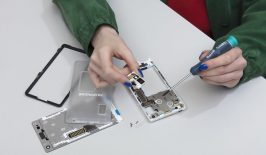Smartphones are incredibly resource-intensive to produce, and the consumerist obsession with buying new phones has a huge negative impact on our planet. A new startup, Worthmore, is offering a transparent and sustainable way to turn used phones into positive impact.
The average smartphone is made up of over 60 elements (over half the periodic table!), and many of these are being fast depleted. Indium, for instance, is predicted to be all but gone in 14 years, white silver in 19, and gold in 21. Moreover, mining these increasingly scarce metals and minerals is hugely harmful both to human wellbeing and the environment. But this isn’t the end of it. The minerals are then shipped off to manufacturing plants, which use copious amounts of water and energy – the amount of energy used to manufacture smartphones globally is thought to be roughly equivalent to the amount of electricity India uses in one year. As most of this production occurs in Asia, which relies heavily on coal, this contributes massively to global warming.
All of this highlights the importance of recycling and reusing old phones. According to data from Worthmore – a start-up that wants to help make it easy for people give their old devices a new life – across Europe, approximately 150 million devices are being replaced every year, yet only 12-20% of smartphones make it into the second-hand market. Most are simply thrown away, contributing to a huge global e-waste problem.
Worthmore was founded in Denmark by an international team in August 2020 and aims to tackle this problem with a simple service. “About 250,000 people upgraded to the iPhone 12 the day it came out in Denmark. That’s more than likely 250,000 high-end devices that were being replaced that just went into the drawer,” explains CEO and founder Tegan Spinner. “There’s people who don’t eat meat to offset their carbon footprint, yet they buy a new smartphone every year, and have five smartphones in a drawer. In that case, probably the biggest impact you’re having on the planet is these used phones. It’s under the radar of even the people who are trying to be the most sustainable. We want to make people aware that leaving your smart phone in your drawer is actually a problem.”
Tegan believes that most people would choose to make a positive difference if they just knew how, and that they would resell or donate their old phones if there was an accessible and transparent way of doing so. While most countries in Europe do have numerous options available if you want to give your phone a second life – including charity organisations that collect old phones, phone manufacturers that offer buy-back schemes and private companies that will buy up your old phone and sell them on for a profit – it’s not always completely clear what exactly will happen to your device and where it will end up. Most companies that buy and then resell your phone tend to do so purely for profit. In contrast, Worthmore seeks not only to raise awareness about what it takes to produce a smartphone, but when you donate a phone to them, they allow you to trace its journey step by step, and they pass on a portion of the phone’s value to a good cause.
How Worthmore works
Users register their phone model on the website, and are sent a pre-paid envelope in which to post them. The company then has the phones fixed, with parts replaced if necessary, before selling them on. Transparency is key to Worthmore’s mission, and you can easily track exactly where your device is by inputting its unique number on the Worthmore website. The company keeps approximately one third of the profit, and the user can decide what to do with the remaining two thirds – with the option to receive money back personally, to donate it to one of the company’s NGO partners, or do both.
Currently Worthmore is partnered with The ReSea Project, the Growing Trees Network, the Danish Nature Fund, and Nordic Ocean Watch. These are trusted organisations focussed on protecting forests and removing plastic from the oceans. In this way, Worthmore hopes to directly counter some of the negative effects that smartphone production has on the environment.
Buying second-hand devices is one way to reduce the climate and environmental impact, but how about sourcing eletronics that have sustainability built in? Find out more about the ethically-produced Shiftphone, the Fairphone and more in RESET’s guide to sustainable electronics.









